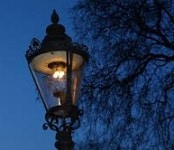The first step we are going to take before delving into the meaning of the term lantern is to know its etymological origin. In this case we can emphasize that it is a word that derives from Latin, from "pharus", and that this, in turn, comes from Greek, specifically from "pharos".
A lantern is a box made of glass or other transparent material that is used to place a light inside. In this way, the luminosity comes out of the container and illuminates the outside.
 Lanterns are objects made of translucent material. Since the 20th century, they usually have a little lamp ( bulb ) that serves to illuminate outdoor spaces. There may be lanterns on the streets, in parks, etc.
Lanterns are objects made of translucent material. Since the 20th century, they usually have a little lamp ( bulb ) that serves to illuminate outdoor spaces. There may be lanterns on the streets, in parks, etc.
Public lighting began to develop little by little in the mid- 16th century . Since then, lanterns of different types that are lit at night have been used to improve security and facilitate movement. Currently, lanterns with compact fluorescent lamps (also known as energy-saving lamps) are often used.
There are many types of lanterns that exist, in addition to those already mentioned. Thus, for example, within the marine field there are several such as the hand lantern, the position lantern, the stern lantern or the running lantern.
In the same way, we cannot forget the existence of the so-called Chinese lanterns that have their origin in China and that are identified by being made of paper and including a light bulb or candle inside. They are so relevant in that country that there is even the Lantern Festival.
We cannot ignore that in Córdoba (Spain) one of its tourist attractions is the so-called Christ of the Lanterns. It is a sculpture of a Christ located in the Plaza de Capuchinos, near the Cuesta del Bailío, which receives that name because it is surrounded by a total of eight lanterns.
It is a sculpture that was made in the 18th century, specifically in the year 1794, by the artist Juan Navarro León and currently there is no tourist who visits the city who does not come to see said work in situ. Specifically, it is best to see it at night because of the magic that the place gives off.
Within the framework of board games (including card games), bluffing is a false move that is developed with the aim of frightening or disconcerting the opponent. The act of bluffing, in this sense, consists of lying to try to influence the opponent's behavior .
Similarly, in some regions a bluff is known as a saying or action that has no basis, or an individual who usually lies and boasts or brags about something he or she does not possess.
«Farol» , finally, is the title of a tango with music by Virgilio Expósito and lyrics by Homero Expósito . Osvaldo Pugliese 's orchestra, with Roberto Chanel on vocals, was the first group to record this tango, a record that dates back to July 1943 .
